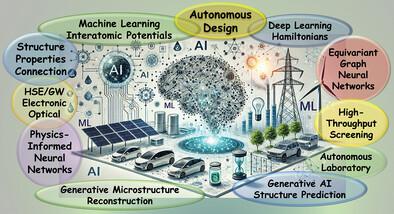当前位置:
X-MOL 学术
›
Adv. Energy Mater.
›
论文详情
Our official English website, www.x-mol.net, welcomes your
feedback! (Note: you will need to create a separate account there.)
Recent Advances in Machine Learning‐Assisted Multiscale Design of Energy Materials
Advanced Energy Materials ( IF 24.4 ) Pub Date : 2024-12-11 , DOI: 10.1002/aenm.202403876 Bohayra Mortazavi
Advanced Energy Materials ( IF 24.4 ) Pub Date : 2024-12-11 , DOI: 10.1002/aenm.202403876 Bohayra Mortazavi

|
This review highlights recent advances in machine learning (ML)‐assisted design of energy materials. Initially, ML algorithms were successfully applied to screen materials databases by establishing complex relationships between atomic structures and their resulting properties, thus accelerating the identification of candidates with desirable properties. Recently, the development of highly accurate ML interatomic potentials and generative models has not only improved the robust prediction of physical properties, but also significantly accelerated the discovery of materials. In the past couple of years, ML methods have enabled high‐precision first‐principles predictions of electronic and optical properties for large systems, providing unprecedented opportunities in materials science. Furthermore, ML‐assisted microstructure reconstruction and physics‐informed solutions for partial differential equations have facilitated the understanding of microstructure–property relationships. Most recently, the seamless integration of various ML platforms has led to the emergence of autonomous laboratories that combine quantum mechanical calculations, large language models, and experimental validations, fundamentally transforming the traditional approach to novel materials synthesis. While highlighting the aforementioned recent advances, existing challenges are also discussed. Ultimately, ML is expected to fully integrate atomic‐scale simulations, reverse engineering, process optimization, and device fabrication, empowering autonomous and generative energy system design. This will drive transformative innovations in energy conversion, storage, and harvesting technologies.
中文翻译:

机器学习辅助能源材料多尺度设计研究进展
本综述重点介绍了机器学习 (ML) 辅助能源材料设计的最新进展。最初,通过在原子结构与其结果特性之间建立复杂的关系,ML 算法成功地应用于筛选材料数据库,从而加速了具有所需特性的候选物的识别。最近,高精度 ML 原子间电位和生成模型的开发不仅提高了对物理特性的稳健预测,还显着加速了材料的发现。在过去的几年里,ML 方法实现了大型系统的电子和光学特性的高精度第一性原理预测,为材料科学提供了前所未有的机会。此外,ML 辅助的微结构重建和偏微分方程的物理信息解有助于理解微观结构-性能关系。最近,各种 ML 平台的无缝集成导致了自主实验室的出现,这些实验室结合了量子力学计算、大型语言模型和实验验证,从根本上改变了新型材料合成的传统方法。在强调上述最新进展的同时,还讨论了存在的挑战。最终,ML 有望完全集成原子级仿真、逆向工程、流程优化和设备制造,从而为自主和生成能源系统设计提供支持。这将推动能源转换、储存和收集技术方面的变革性创新。
更新日期:2024-12-11
中文翻译:

机器学习辅助能源材料多尺度设计研究进展
本综述重点介绍了机器学习 (ML) 辅助能源材料设计的最新进展。最初,通过在原子结构与其结果特性之间建立复杂的关系,ML 算法成功地应用于筛选材料数据库,从而加速了具有所需特性的候选物的识别。最近,高精度 ML 原子间电位和生成模型的开发不仅提高了对物理特性的稳健预测,还显着加速了材料的发现。在过去的几年里,ML 方法实现了大型系统的电子和光学特性的高精度第一性原理预测,为材料科学提供了前所未有的机会。此外,ML 辅助的微结构重建和偏微分方程的物理信息解有助于理解微观结构-性能关系。最近,各种 ML 平台的无缝集成导致了自主实验室的出现,这些实验室结合了量子力学计算、大型语言模型和实验验证,从根本上改变了新型材料合成的传统方法。在强调上述最新进展的同时,还讨论了存在的挑战。最终,ML 有望完全集成原子级仿真、逆向工程、流程优化和设备制造,从而为自主和生成能源系统设计提供支持。这将推动能源转换、储存和收集技术方面的变革性创新。






























 京公网安备 11010802027423号
京公网安备 11010802027423号